
Students reflect on a summer of work with the Office of Sustainability
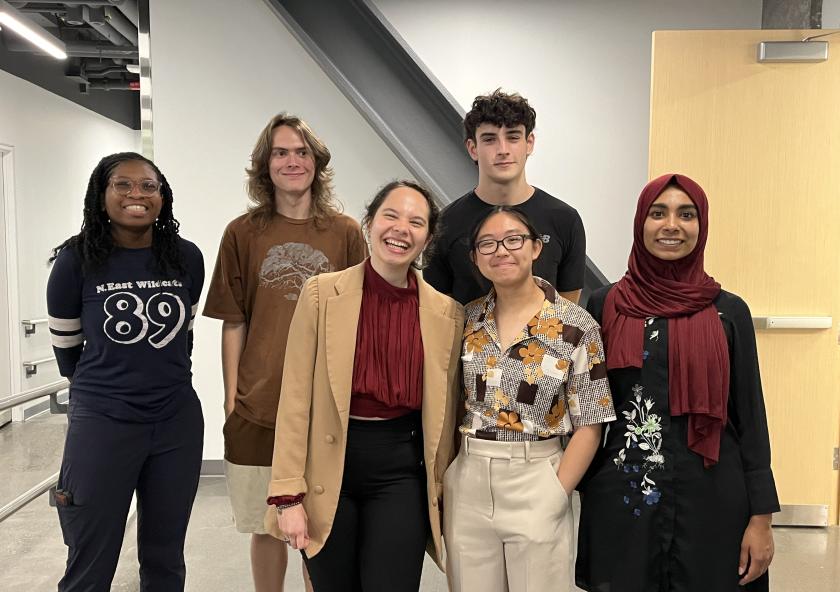
This summer, the Office of Sustainability welcomed a cohort of six undergraduate students. The group of student researchers—Jordyn Goldson '27, Dylan Cook '27, Sawyer Garrett '26, Rudiba Laiba '25, Ananda Santos Figueriedo '25, and Megan Lim '24—joined MITOS for the summer to support the efforts and goals of the Office, tackle real-world challenges aligned with the missions of The Climate Project at MIT, and work as a team. In their time with the Office, the students completed research, analyzed data sets, produced videos, built new partnerships, and grappled with challenging issues of climate and sustainability during daylong hackathons. They also partnered with other students across campus, having weekly dinners with students taking part in the Priscilla King Gray Public Service Center (PKG) Boston Summer of Service, and enrolling with them in the Experiential Ethics course. As the students wrapped up their work with the office, each of them reflected on the summer, their favorite experiences, and lessons learned. Read each of their stories below.
Dylan Cook '27
What topic/ focus within the cohort role was most interesting to you and why?
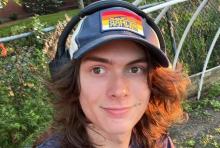
I was particularly interested in communications projects at MITOS because climate communications is one of the most important ways of engaging and informing the public about sustainability issues! Newer forms of media such as Instagram and YouTube have become the primary source of news for many, and it’s important we incorporate sustainability messaging.
What has been the most surprising finding or favorite experience in this role?
Each student in the cohort gets to pick from a broad list of summer projects across campus, which allows for a lot of freedom and self-direction. The projects span a broad variety of topics ranging from data management to gardening, so there were several projects geared towards my interests that I wouldn’t have expected to find in the sustainability field.
How does the work of this role tie into your coursework or future plans?
I’m planning on getting better at Photoshop and Premiere Pro to better make media content in the future, and making posts and other forms of media in this role gave me a lot of practice with those tools. Additionally, I hope to work with microplastics in my career, and I learned a lot about plastic production and waste in this role, giving me a head start towards that research.
Sawyer Garrett '26
What interested you about the summer cohort position with MITOS?
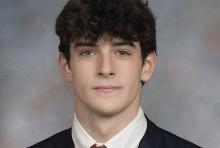
Working as a part of the MITOS student summer cohort allowed me to get more involved in MIT’s sustainability and climate action plan. While climate action isn't the focus of my major, I was looking to get more involved in sustainability work on campus. The MITOS summer cohort was a great experience that allowed me to learn new skills and resulted in actionable recommendations at the institutional scale.
What topic/ focus within the cohort role was most interesting to you and why?
My main project over the summer has been an analysis of MIT’s purchased goods data in order to help quantify MIT’s scope 3 emissions. Through this project I learned a lot of new skills including data visualization software like Tableau. In working on this project I was also able to learn a lot from MITOS staff and a few of my fellow interns.
What has been the most surprising finding or favorite experience in this role?
My favorite experience has been all of our one day hackathons where we got to take deep dives into new topics and present our findings to the staff. These one day projects helped us develop new skills and forced us to approach problems with a very analytical mindset in order to be able to reach a conclusion in just a few hours.
Jordyn Goldson '27
What topic/ focus within the cohort role was most interesting to you and why?
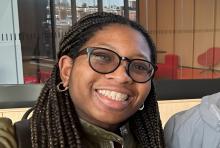
The topic most interesting to me was probably a hackathon we did on eliminating single use plastics on campus. I never thought about all the behavioral changes required from the consumer to implement such a system. The experience has made me much more conscious of whenever I use single use plastics.
What interested you about the summer cohort position with MITOS?
I didn't know about a lot of the climate projects and work that was being done on campus, and this felt like a great opportunity to learn more.What has been the most surprising finding or favorite experience in this role?
My favorite experience was definitely the hackathons, I thought that they were always very interesting. Spending a day hearing everyone's thoughts, and generating a solution together was really productive and valuable process.
How does the work of this role tie into your coursework or future plans?
As I'm a Course 1 major this whole experience tied in very well. It helped me learn about the steps you take to mitigate future climate risk to infrastructure. I also learned about the need to include vegetation and even focus on it in projects.
Rudiba Laiba '25
What interested you about the summer cohort position with MITOS?

I was drawn to the opportunity to engage in hands-on sustainability research while also gaining experience with technical data science tools, including Python, Dagster, Tableau, SQL, and AWS. I was eager to apply the knowledge gained from my classes in a practical setting and broaden my skill set by working with data pipelines and data visualizations. This role offered a unique chance to contribute to meaningful projects while expanding my technical expertise.
What topic/focus within the cohort role was most interesting to you and why?
Working with Scope 3 greenhouse gas emissions was particularly rewarding for me. I was fascinated by the process of analyzing this data to identify key performance indicators (KPIs) and extract actionable insights on emissions. Additionally, I enjoyed providing quality control by reviewing code and advising on the back-end development of data systems. Refining the analysis of emissions to recommend actions for reducing emissions at various levels within MIT was a challenging yet fulfilling experience. Ensuring that the dashboard visualizations were effective and met user experience expectations was also a highlight of my work.
What has been the most surprising finding or favorite experience in this role?
The hackathons! They were intense but incredibly rewarding. I loved collaborating with my cohort to solve real-world sustainability problems. The hackathons not only allowed me to apply and enhance my technical skills but also fostered team bonding and innovative ideation. I enjoyed developing product management and consulting skills through working to solve pressing sustainability issues.
I feel incredibly grateful to have had an amazing cohort and caring mentors!
How does the work of this role tie into your coursework or future plans?
This role directly aligns with my future aspirations of working in data science and product management. I was able to deepen my technical skills and gain hands-on experience with tools like Tableau, data pipelines, Dagster, SQL, and AWS. The experience was a great stepping stone towards my goal of making a tangible impact through a combination of technical expertise and leadership.
Ananda Santos Figueiredo '25
What interested you about the summer cohort position with MITOS?
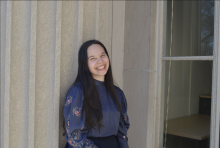
I originally heard about the Office of Sustainability and this position through one of the Decarbonization Forums, which I attended as part of a class (Climate Change & Planetary Health). In that event, I was really surprised by all the work that MIT was doing on making our campus reflect the innovation and excitement that happens through research on our campus. I was really interested in being part of such an inspiring, value-driven community. As a Climate Systems Science and Sustainability major, I was also really curious on how the things I learned about in class could be acted upon in a campus community. As it turns out, MIT is so big and involves so many people that our campus could be considered a small town! And, as such, it has to go through the same sustainability challenges a lot of places now have to tackle, including increasing temperatures, rainfall, and aging infrastructure. MIT is at an advantage, however, because we have the awesome research that already goes on in our campus. It was the possibility of connecting the two which drew me to this position, and I am very happy to say that this summer delivered. And, of course, spending the summer in Boston could never hurt!
What topic/ focus within the cohort role was most interesting to you and why?
Most of my time this summer has been spent trying to understand and measure the impact of high temperatures on campus. I’ve had an absolute blast working on this project, with awesome mentors (shout-out to Brian Goldberg, our Assistant Director!) and the opportunity to learn a lot more on data analysis and coding. I have also had the experience of interacting with many different groups of people, since the City of Cambridge is trying to incorporate high-temperature sensing into some of their own projects, and a communications piece I created on our campus Cool Spots ended up on the MIT Instagram with thousands of likes! Working on this topic quickly became my favorite because of the breadth of skills I got to learn and the way it interacted so directly with the idea of campus as a test bed.
What has been the most surprising finding or favorite experience in this role?
Almost every week, we had a series of day-long brainstorming/project events called hackathons, which were so much fun! They were as varied as trying to think of climate and energy justice in carbon offsets to transportation to communications on campus (which ended up with some hilarious memes, you should check out MITOS’s Instagram page to see us having fun!). A favorite of mine was being able to connect with PowerCorps, a civilian climate corps based in Boston and focused on green jobs and climate justice, and give a tour to dozens of members on my work. It was very inspiring. No matter the topic, these hackathons left me with a deeper understanding of what sustainability tackles today and a stronger connection to the staff and other students in my cohort. We had a lot of fun together this summer, and some of my favorite moments have been playing ping pong, taking care of a garden, and just chatting in the kitchen about life, the universe, and everything else. One of my key takeaways this summer has been that we need to work together with many varied areas of expertise to solve climate change—and I am so glad we got to exercise that through our cohort! I leave this summer with much more faith and a varied toolkit to help tackle environmental problems, and a lot of gratitude for the Office of Sustainability for being a home these past ten weeks!
Are you an undergraduate or graduate MIT student interested in working with MITOS this fall? Explore student opportunities.

